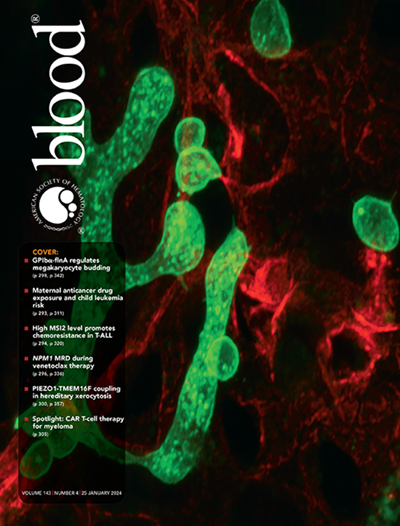匹配供体同种异体CAR-T治疗成人B-ALL:毒性、疗效、重复给药和淋巴细胞清除的重要性。
IF 21
1区 医学
Q1 HEMATOLOGY
引用次数: 0
摘要
自体靶向cd19的CAR-T已经改变了复发/难治性成人b细胞急性淋巴细胞白血病(B-ALL)的治疗方法,但同种异体干细胞移植(allogeneic stem cell transplant, sct)后复发通常伴随着严重淋巴细胞减少、t细胞适应性受损和需要紧急治疗的侵袭性疾病,这使得自体CAR-T的递送具有挑战性。我们开发了一种同种异体匹配供体CD19CAR产品(CAR-DLI),用于治疗同种异体sct失败后的成人B-ALL。在这里,我们评估了CAR-DLI前淋巴细胞消耗化疗(LD)的风险/收益,以及按照传统的DLI计划/方案重复CAR-DLI给药的疗效。年龄16-70岁的患者在同种异体细胞移植后患有r/r B-ALL。主要观察指标为CAR-DLI制造的毒性和可行性;次要结局包括CAR-DLI植入/扩展/持续。17例同种异体sct供者白血病,14例患者(中位年龄,43岁)接受输注。登记时的中位疾病负担为63.5%骨髓母细胞(范围,MRD-100%)。1-7例患者单独接受car - dli治疗;8-14例患者接受CAR-DLI+LD联合氟达拉滨/环磷酰胺治疗。CAR-DLI+LD与单独CAR-DLI相比,CAR-DLI的峰值植入(93134拷贝/ug gDNA比8010拷贝/ug gDNA)、扩增(858,101拷贝/ug gDNA比39,038拷贝/ug gDNA/28d)和持续(中位197天比32天)相关。CAR-DLI+LD与单独CAR-DLI的免疫毒性无关,GvHD(1级/皮肤)仅影响2/14(14%)患者。CAR-DLI+LD与单独CAR-DLI在12m时获得了更好的无事件生存期(EFS)和总生存期(OS) (57% vs 29%;83% vs 29%)。对形态学/MRD+复发的8/14(57%)患者进行重复CAR-DLI给药,但植入/扩张或毒性/疗效最小。CAR-DLI+LD具有可容忍的安全性,没有明显的GvHD,并且与单独CAR-DLI相比具有明显更好的预后。在本分析中,超过剂量1的CAR-DLI重复剂量没有发现有效。NCT02893189。本文章由计算机程序翻译,如有差异,请以英文原文为准。
Matched donor allogeneic CAR-T for adult B-ALL: toxicity, efficacy, repeat dosing, and the importance of lymphodepletion.
Autologous CD19-targeting CAR-T has transformed management of relapsed/refractory adult B-cell acute lymphoblastic leukaemia(B-ALL) but relapse post-allogeneic stem cell transplant(allo-SCT) is frequently accompanied by profound lymphopenia, impaired T-cell fitness and aggressive disease requiring urgent treatment, making autologous CAR-T challenging to deliver. We developed an allogeneic matched-donor CD19CAR product (CAR-DLI) for adult B-ALL following allo-SCT failure. Here we evaluate the risks/benefits of pre-CAR-DLI lymphodepleting chemotherapy (LD), and the efficacy of repeat CAR-DLI dosing as per conventional DLI scheduling/protocols. Patients aged 16-70y with r/r B-ALL post-allo-SCT were eligible. Primary outcomes were toxicity and feasibility of CAR-DLI manufacture; secondary outcomes included CAR-DLI engraftment/ expansion/ persistence. 17 allo-SCT donors were leukapheresed and 14 patients (median age,43y) were infused. Median disease burden at registration was 63.5% bone marrow blasts (range, MRD-100%). Patients 1-7 received CAR-DLI-alone; patients 8-14 received CAR-DLI+LD with fludarabine/cyclophosphamide. CAR-DLI+LD vs CAR-DLI-alone was associated with superior peak CAR-DLI engraftment (93,134 vs. 8010 copies/ug gDNA), expansion (858,101 vs. 39,038 copies/ug gDNA/28d) and persistence (median 197 days vs. 32 days). CAR-DLI+LD was not associated with more immunotoxicity than CAR-DLI-alone, and GvHD (grade-1/skin) affected only 2/14(14%) patients. CAR-DLI+LD vs CAR-DLI-alone conferred superior event-free-survival (EFS) and overall-survival (OS) at 12m (57% vs 29%; 83% vs 29%). Repeat CAR-DLI dosing was administered to 8/14(57%) patients with morphological/MRD+ relapse, but with minimal engraftment/expansion or toxicity/efficacy. CAR-DLI+LD has a tolerable safety profile without significant GvHD and is associated with significantly better outcomes than CAR-DLI-alone. Repeat CAR-DLI dosing beyond dose 1 was not found to be effective in this analysis. NCT02893189.
求助全文
通过发布文献求助,成功后即可免费获取论文全文。
去求助
来源期刊

Blood
医学-血液学
CiteScore
23.60
自引率
3.90%
发文量
955
审稿时长
1 months
期刊介绍:
Blood, the official journal of the American Society of Hematology, published online and in print, provides an international forum for the publication of original articles describing basic laboratory, translational, and clinical investigations in hematology. Primary research articles will be published under the following scientific categories: Clinical Trials and Observations; Gene Therapy; Hematopoiesis and Stem Cells; Immunobiology and Immunotherapy scope; Myeloid Neoplasia; Lymphoid Neoplasia; Phagocytes, Granulocytes and Myelopoiesis; Platelets and Thrombopoiesis; Red Cells, Iron and Erythropoiesis; Thrombosis and Hemostasis; Transfusion Medicine; Transplantation; and Vascular Biology. Papers can be listed under more than one category as appropriate.
 求助内容:
求助内容: 应助结果提醒方式:
应助结果提醒方式:


